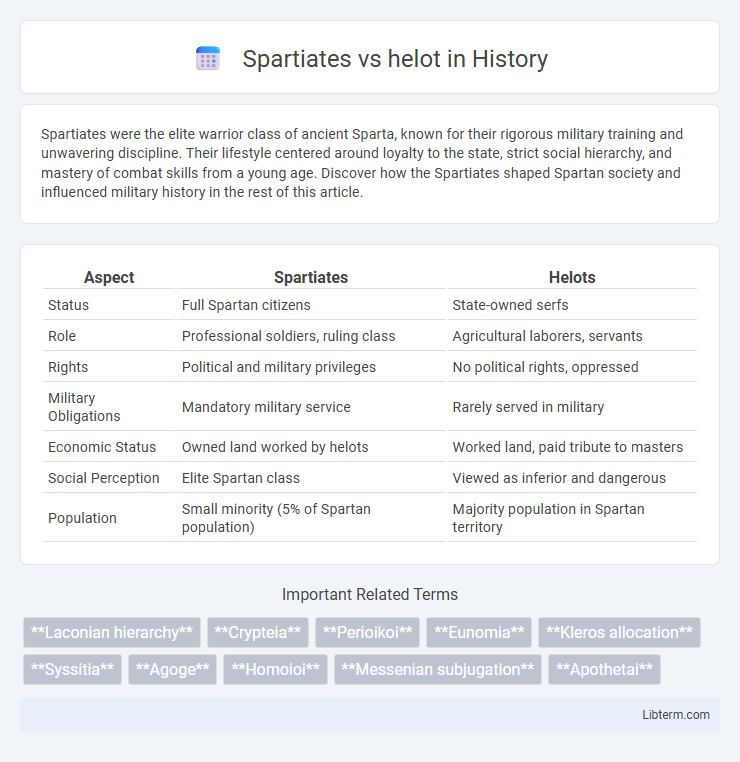Spartiates were the elite warrior class of ancient Sparta, known for their rigorous military training and unwavering discipline. Their lifestyle centered around loyalty to the state, strict social hierarchy, and mastery of combat skills from a young age. Discover how the Spartiates shaped Spartan society and influenced military history in the rest of this article.
Table of Comparison
| Aspect | Spartiates | Helots |
|---|---|---|
| Status | Full Spartan citizens | State-owned serfs |
| Role | Professional soldiers, ruling class | Agricultural laborers, servants |
| Rights | Political and military privileges | No political rights, oppressed |
| Military Obligations | Mandatory military service | Rarely served in military |
| Economic Status | Owned land worked by helots | Worked land, paid tribute to masters |
| Social Perception | Elite Spartan class | Viewed as inferior and dangerous |
| Population | Small minority (5% of Spartan population) | Majority population in Spartan territory |
Origins of the Spartiates and Helots
Spartiates originated as the warrior elite descended from Dorian invaders who settled in Laconia during the Greek Dark Ages, establishing a rigid social hierarchy. Helots were the indigenous population of the region, primarily Messenians, subjugated and enslaved after Spartan conquest to serve as agricultural laborers. This stark division between the ruling Spartiates and the oppressed Helots was central to Spartan society and its militaristic dominance in ancient Greece.
Social Hierarchy in Ancient Sparta
Spartiates occupied the highest tier in the Ancient Spartan social hierarchy, serving as full citizens and elite warriors with political rights and land ownership, while helots formed the lowest class, enslaved agricultural laborers essential to Spartan economy. The rigid social structure depended on helots supporting the Spartan military elite by providing food and manual labor, enabling Spartiates to dedicate themselves exclusively to warfare and governance. Continuous tensions and periodic helot revolts reflected the oppressive dynamics of this system, reinforcing the social stratification that underpinned Sparta's militaristic society.
The Role of Spartiates in Spartan Society
Spartiates served as the ruling warrior elite in Spartan society, maintaining military dominance and political authority over the helots, who were state-owned serfs responsible for agricultural labor. Their rigorous training and communal lifestyle ensured they remained a disciplined and effective military force, upholding Sparta's oligarchic structure. The Spartiate class's control over the helot population was essential for sustaining Sparta's unique social system and economy.
Helots: Life and Duties under Spartan Rule
Helots, the subjugated class in Spartan society, served as agricultural laborers and state-owned serfs responsible for sustaining the Spartan economy through farming the land. Their lives were marked by strict control, harsh treatment, and limited freedom, as they were regularly subjected to intimidation and surveillance to prevent rebellion. Despite their essential role in supporting the Spartan military elite known as Spartiates, helots had no political rights and lived under constant threat of violence and exploitation.
Military Expectations: Spartiates vs Helots
Spartiates, the full Spartan citizens, were expected to maintain rigorous military training from a young age, serving as elite hoplite soldiers who defended Sparta's dominance. Helots, the subjugated population primarily responsible for agricultural labor, had minimal military roles, often serving as auxiliary troops or light infantry in times of war. The stark contrast in military expectations reinforced the social hierarchy, with Spartiates embodying the warrior ethos essential to Spartan society's survival and control over the helots.
Legal Rights and Restrictions
Spartiates held full citizenship rights in ancient Sparta, including political participation, land ownership, and military service, while helots were state-owned serfs with no legal rights or personal freedoms. Spartiates enjoyed protections under Spartan law, such as trial rights and property inheritance, whereas helots faced harsh restrictions, forced labor, and could be subjected to arbitrary punishment without legal recourse. The legal distinction reinforced the rigid social hierarchy, ensuring Spartiate dominance and helot subjugation in Spartan society.
Methods of Control: Spartan Domination over Helots
Spartans maintained control over the Helots through a strict system of military dominance and psychological intimidation, including the annual krypteia--secret police missions targeting potential Helot uprisings. Helots were subjected to harsh labor demands and public humiliation, ensuring their subjugation and minimizing rebellion risks. Spartan society institutionalized this oppression to sustain their agrarian economy and militaristic expansion.
Economic Contributions of Spartiates and Helots
Spartiates wielded economic power primarily through their military dominance and control over land, relying on helots to perform agricultural labor and sustain Spartan society. Helots, as state-owned serfs, produced the agricultural surplus essential for feeding the Spartan citizenry and supporting their warrior lifestyle. The symbiotic economic relationship between Spartiates and helots underpinned Sparta's military-focused social structure and its unique agrarian economy.
Revolts and Resistance: Helot Uprisings
Helot uprisings in ancient Sparta were frequent and posed a constant threat to the Spartiates, driven by harsh enslavement and exploitation. These revolts, notably the massive helot rebellion after the earthquake in 464 BCE, forced Sparta to maintain a permanent military presence and reinforced the strict social and political controls over the helots. Spartan resilience against revolts was ensured through rigorous surveillance, annual declarations of war on helots, and violent suppression to prevent large-scale insurrections.
Legacy and Historical Impact
Spartiates' dominance established a rigid social hierarchy that shaped Spartan society, while the subjugation of helots fueled military innovation and discipline. The enduring legacy of this dynamic influenced concepts of citizenship, military training, and class struggle in ancient Greece. Historical impact includes the reinforcement of oligarchic governance and the model of a warrior culture that inspired later Western military traditions.
Spartiates Infographic

 libterm.com
libterm.com